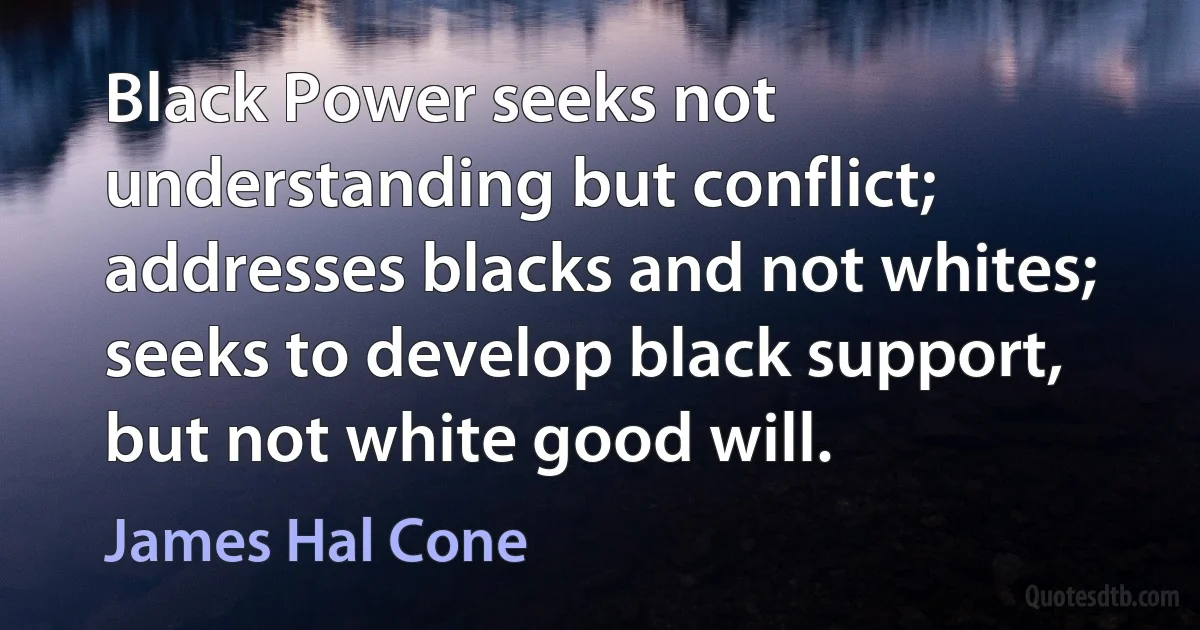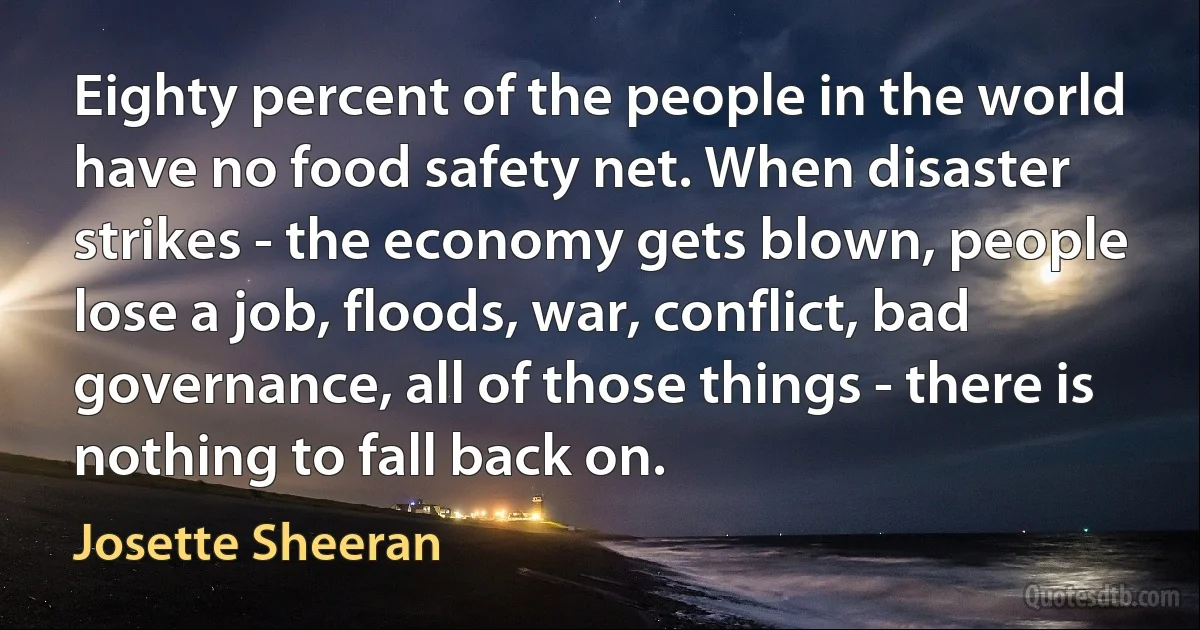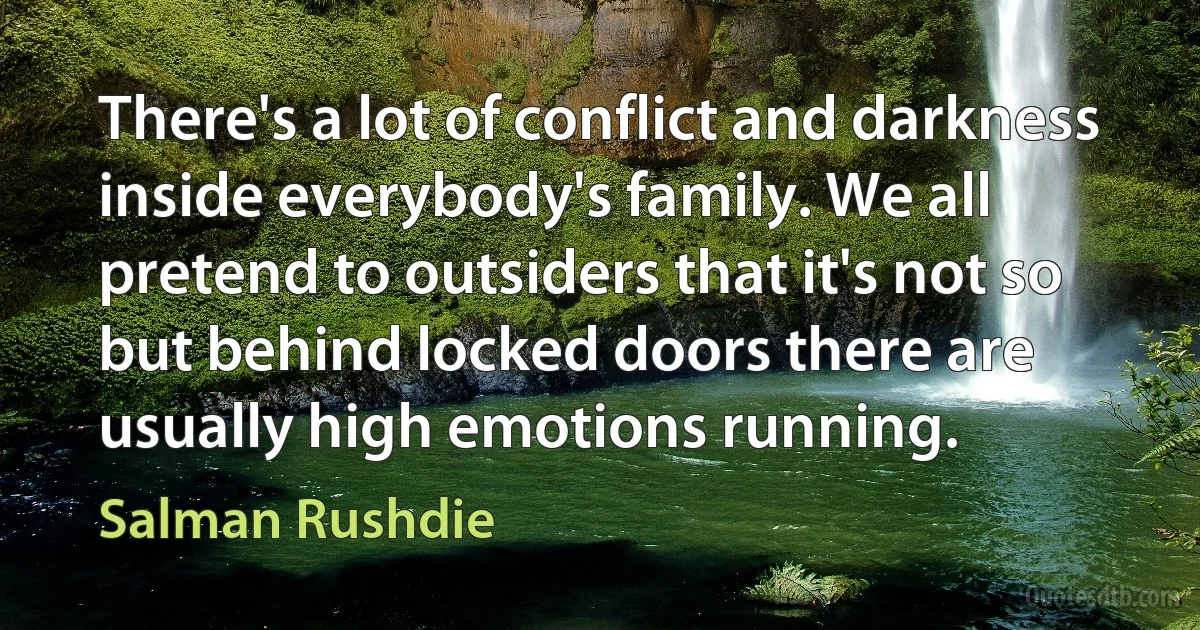Conflict Quotes - page 43
I suggest that US foreign policy can still be defined as "kiss my ass or I'll kick your head in." But of course it doesn't put it like that. It talks of "low intensity conflict..." What all this adds up to is a disease at the very centre of language, so that language becomes a permanent masquerade, a tapestry of lies.

Harold Pinter
Resolution of conflict, easing of stress must come from the penetration into many groups of wide and common interests which, by a process of dilution, will weaken other groups often artificially maintained.
It is of considerable importance, then, to look for large groups of individuals bound together not by temporal ties of tradition or political artificiality, but by tested ties of common interest so world-wide, indeed so universal, as to be recognized by any individual.

John H. Manley
In 1938 and at the age of eighty, Hobson decided to republish Imperialism: A Study. By the late 1930s, public opinion was becoming much more critical of empire and imperialism: one prominent imperial historian of the time, W. K. Hancock, wrote that 'to... an increasing proportion of the ordinary public the "imperialist" is a robber and a bully'. Under growing Marxist influence there was also an increasing tendency to offer economic interpretations of imperial expansion and control. Encouraged by these trends and convinced that the looming conflict between Britain and France on the one side, and Germany, Italy and Japan on the other, was basically an attempt to re-divide the imperial spoils, Hobson decided that his ancient text was worth reprinting. But in republishing it, and despite adding a long preface, Hobson gave no indication that he had ever held different views.

Peter Cain
Isn't it desperately sad that, at a time when we face formidable problems – poverty, HIV/AIDS, conflict – that the Anglican Communion can invest so much energy on disagreements about human sexuality? A communion that used to boast that one of its distinctive characteristics was something called comprehensiveness, that our communion, the Anglican Church, included just about everybody. Even if you had the most weird theology you could come in, you were allowed. And now we, who used to be held up in admiration by many because of this inclusiveness, are now spending time working out how we can excommunicate one another. God looks on and God weeps. God weeps.

Desmond Tutu
Although, therefore, the theory of nationality is more absurd and more criminal than the theory of socialism, it has an important mission in the world, and marks the final conflict, and therefore the end, of two forces which are the worst enemies of civil freedom, - the absolute monarchy and the revolution.

John W. Campbell
The conflict between liberty under divine authority and the absolutism of human authorities ended disastrously. ...In the very year 586 [BCE], in which the flood of Asiatic despotism closed over the city which had been, and was destined again to be, the sanctuary of freedom in the East, a new home was prepared for it in the West, where, guarded by the sea and the mountains, and by valiant hearts, that stately plant was reared under whose shade we dwell, and which is extending its invincible arms so slowly and yet so surely over the civilised world.

John W. Campbell
President Abbas, you've dedicated your life to advancing the Palestinian cause. Must this conflict continue for generations, or will we enable our children and our grandchildren to speak in years ahead of how we found a way to end it? That's what we should aim for, and that's what I believe we can achieve.

Benjamin Netanyahu
If we regard Iran as a nation, there is no reason it shouldn't have correct relations with the United States or any other country. Decades of opinion polls show that a majority of Iranians have a good opinion of America. But Iran today suffers from a split personality: It is both a nation and, as the Islamic Republic, also a messianic cause. And the Islamic Republic of Iran, far from being part of the solution, is at the root of the conflict tearing the Middle East apart. It has built Shiite militias in Lebanon, Syria and Iraq, not to mention Afghanistan, with the aim of "exporting” its Khomeinist ideology. The mullahs' quest for an empire has provoked violent reaction from Sunni Arabs and enabled terrorist outfits such as al Qaeda in its many versions, including ISIS, to find a new audience and a narrative of victimhood. As long as Iran remains a "cause,” it can't normalize relations with anybody, let alone America. Coexistence among nations is not the same as that among causes.

Amir Taheri
When it comes to the Middle East, Trump again has the advantage of being an unknown quantity. Although he has talked a lot of nonsense about foreign policy, he has also insisted on a valid point: the current US policy simply doesn't work. That, in turn, might persuade him to look for something different, creating at least an opportunity for repairing some of the damage done by Obama's wayward policies to peace and stability in the Middle East. Clinton, in contrast, already has a record. She backed the Muslim Brotherhood in Egypt before Obama decided to ditch them. She was co-pilot in Obama's disastrous policy in Libya. On the perennial Arab-Israeli conflict, she did the hoola dance choreographed by Obama, going round and round and getting nowhere. Clinton was also in the driving seat when the US launched secret talks in Oman with Iran's President Mahmoud Ahmadinejad, a textbook example of diplomatic chicanery that led to the great swindle known as "the Iran Nuclear deal.”.

Amir Taheri
The accidents of my life have given me the ability to make stories in which different parts of the world are brought together, sometimes harmoniously, sometimes in conflict, and sometimes both - usually both. The difficulty in these stories is that if you write about everywhere you can end up writing about nowhere.

Salman Rushdie
We are seeing a globalization of indifference. There is a culture of conflict, which makes us think only of ourselves. Makes us live in soap bubbles which, however lovely, are also insubstantial. We've become used to the suffering of others. It doesn't affect me. No one in our world feels responsible. Who is responsible for the blood of our...

Pope Francis
On the campus of Outlaw College, professors of essential insanities would characterize the conflicting attitudes of Nina Jablonski and Leigh-Cheri as indicative of a general conflict between social idealism and romanticism. As any of the learned professors would explain, plied with sufficient tequila, no matter how fervently a romantic might support a movement, he or she eventually must withdraw from active participation in that movement because the group ethic - the supremacy of the organization over the individual - is an affront to intimacy. Intimacy is the principal source of the sugars with which this life is sweetened. It is absolutely vital to the essential insanities.

Tom Robbins
In an earlier day, the rich lived at the expense of the poor, directly and unequivocally; in a modern economy, unproductive citizens increasingly live at the expense of productive ones-though in an equivocal way, since they are told, and believe, that they are disadvantaged and deserve more still. Today, in fact, a good half of the population of every modern nation is made up of people with little or no income, who are exempt from taxes and live, to a large extent, off the other half of the population, which pays taxes. If such a situation were to be radicalized, it could give rise to massive social conflict. The eminently plausible free-market thesis of exploitation by the unproductive would then have prevailed over the much less promising socialist thesis of the exploitation of labor by capital.

Peter Sloterdijk



